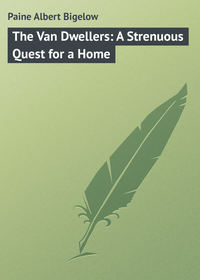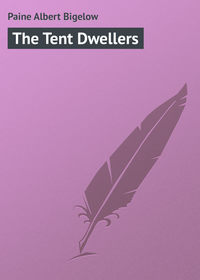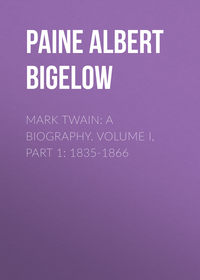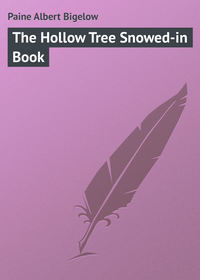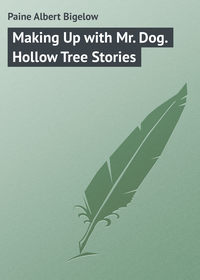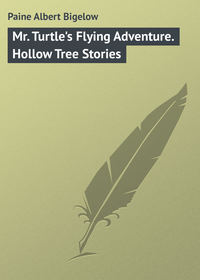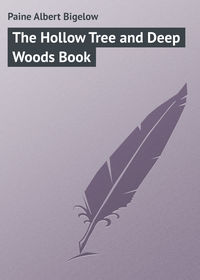
Mark Twain: A Biography. Volume I, Part 2: 1835-1866
I most cordially hate the lecture field. And after all, I shudder to think I may never get out of it. In all conversation with Gough, and Anna Dickinson, Nasby, Oliver Wendell Holmes, Wendell Phillips, and the other old stagers, I could not observe that they ever expected or hoped to get out of the business. I don't want to get wedded to it as they are.
He declined further engagements on the excuse that he must attend to getting out his book. The revised proofs were coming now, and he and gentle Livy Langdon read them together. He realized presently that with her sensitive nature she had also a keen literary perception. What he lacked in delicacy—and his lack was likely to be large enough in that direction—she detected, and together they pruned it away. She became his editor during those happy courtship days—a position which she held to her death. The world owed a large debt of gratitude to Mark Twain's wife, who from the very beginning—and always, so far as in her strength she was able—inspired him to give only his worthiest to the world, whether in written or spoken word, in counsel or in deed. Those early days of their close companionship, spiritual and mental, were full of revelation to Samuel Clemens, a revelation that continued from day to day, and from year to year, even to the very end.
The letter to Bliss and the proofs were full of suggested changes that would refine and beautify the text. In one of them he settles the question of title, which he says is to be:
THE INNOCENTS ABROADorTHE NEW PILGRIM'S PROGRESSand we may be sure that it was Olivia Langdon's voice that gave the deciding vote for the newly adopted chief title, which would take any suggestion of irreverence out of the remaining words.
The book was to have been issued in the spring, but during his wanderings proofs had been delayed, and there was now considerable anxiety about it, as the agencies had become impatient for the canvass. At the end of April Clemens wrote: "Your printers are doing well. I will hurry the proofs"; but it was not until the early part of June that the last chapters were revised and returned. Then the big book, at last completed, went to press on an edition of twenty thousand, a large number for any new book, even to-day.
In later years, through some confusion of circumstance, Mark Twain was led to believe that the publication of The Innocents Abroad was long and unnecessarily delayed. But this was manifestly a mistake. The book went to press in June. It was a big book and a large edition. The first copy was delivered July 20 (1869), and four hundred and seventeen bound volumes were shipped that month. Even with the quicker mechanical processes of to-day a month or more is allowed for a large book between the final return of proofs and the date of publication. So it is only another instance of his remembering, as he once quaintly put it, "the thing that didn't happen."—[In an article in the North American Review (September 21, 1906) Mr. Clemens stated that he found it necessary to telegraph notice that he would bring suit if the book was not immediately issued. In none of the letters covering this period is there any suggestion of delay on the part of the publishers, and the date of the final return of proofs, together with the date of publication, preclude the possibility of such a circumstance. At some period of his life he doubtless sent, or contemplated sending, such a message, and this fact, through some curious psychology, became confused in his mind with the first edition of The Innocents Abroad.]
LXXI
THE GREAT BOOK OF TRAVEL
'The Innocents Abroad' was a success from the start. The machinery for its sale and delivery was in full swing by August 1, and five thousand one hundred and seventy copies were disposed of that month—a number that had increased to more than thirty-one thousand by the first of the year. It was a book of travel; its lowest price was three and a half dollars. No such record had been made by a book of that description; none has equaled it since.—[One must recall that this was the record only up to 1910. D.W.]
If Mark Twain was not already famous, he was unquestionably famous now. As the author of The New Pilgrim's Progress he was swept into the domain of letters as one riding at the head of a cavalcade—doors and windows wide with welcome and jubilant with applause. Newspapers chorused their enthusiasm; the public voiced universal approval; only a few of the more cultured critics seemed hesitant and doubtful.
They applauded—most of them—but with reservation. Doctor Holland regarded Mark Twain as a mere fun maker of ephemeral popularity, and was not altogether pleasant in his dictum. Doctor Holmes, in a letter to the author, speaks of the "frequently quaint and amusing conceits," but does not find it in his heart to refer to the book as literature. It was naturally difficult for the East to concede a serious value to one who approached his subject with such militant aboriginality, and occasionally wrote "those kind." William Dean Howells reviewed the book in the Atlantic, which was of itself a distinction, whether the review was favorable or otherwise. It was favorable on the whole, favorable to the humor of the book, its "delicious impudence," the charm of its good-natured irony. The review closed:
It is no business of ours to fix his rank among the humorists California has given us, but we think he is, in an entirely different way from all the others, quite worthy of the company of the best.
This is praise, but not of an intemperate sort, nor very inclusive. The descriptive, the poetic, the more pretentious phases of the book did not receive attention. Mr. Howells was perhaps the first critic of eminence to recognize in Mark Twain not only the humorist, but the supreme genius-the "Lincoln of our literature." This was later. The public—the silent public—with what Howells calls "the inspired knowledge of the simple-hearted multitude," reached a similar verdict forthwith. And on sufficient evidence: let the average unprejudiced person of to-day take up the old volume and read a few chapters anywhere and decide whether it is the work of a mere humorist, or also of a philosopher, a poet, and a seer. The writer well remembers a little group of "the simple-hearted multitude" who during the winter of '69 and '70 gathered each evening to hear the Innocents read aloud, and their unanimous verdict that it was the "best book of modern times."
It was the most daring book of its day. Passages of it were calculated to take the breath of the orthodox reader; only, somehow, it made him smile, too. It was all so good-natured, so openly sincere. Without doubt it preached heresy—the heresy of viewing revered landmarks and relics joyously, rather than lugubriously; reverentially, when they inspired reverence; satirically, when they invited ridicule, and with kindliness always.
The Innocents Abroad is Mark Twain's greatest book of travel. The critical and the pure in speech may object to this verdict. Brander Matthews regards it second to A Tramp Abroad, the natural viewpoint of the literary technician. The 'Tramp' contains better usage without doubt, but it lacks the "color" which gives the Innocents its perennial charm. In the Innocents there is a glow, a fragrance, a romance of touch, a subtle something which is idyllic, something which is not quite of reality, in the tale of that little company that so long ago sailed away to the harbors of their illusions beyond the sea, and, wandered together through old palaces and galleries, and among the tombs of the saints, and down through ancient lands. There is an atmosphere about it all, a dream-like quality that lies somewhere in the telling, maybe, or in the tale; at all events it is there, and the world has felt it ever since. Perhaps it could be defined in a single word, perhaps that word would be "youth." That the artist, poor True Williams, felt its inspiration is certain. We may believe that Williams was not a great draftsman, but no artist ever caught more perfectly the light and spirit of the author's text. Crude some of the pictures are, no doubt, but they convey the very essence of the story; they belong to it, they are a part of it, and they ought never to perish. 'A Tramp Abroad' is a rare book, but it cannot rank with its great predecessor in human charm. The public, which in the long run makes mistakes, has rendered that verdict. The Innocents by far outsells the Tramp, and, for that matter, any other book of travel.
THE PURCHASE OF A PAPER
It is curious to reflect that Mark Twain still did not regard himself as a literary man. He had no literary plans for the future; he scarcely looked forward to the publication of another book. He considered himself a journalist; his ambition lay in the direction of retirement in some prosperous newspaper enterprise, with the comforts and companionship of a home. During his travels he had already been casting about for a congenial and substantial association in newspaperdom, and had at one time considered the purchase of an interest in the Cleveland Herald. But Buffalo was nearer Elmira, and when an opportunity offered, by which he could acquire a third interest in the Buffalo Express for $25,000, the purchase was decided upon. His lack of funds prompted a new plan for a lecture tour to the Pacific coast, this time with D. R. Locke (Nasby), then immensely popular, in his lecture "Cussed Be Canaan."
Clemens had met Nasby on the circuit, and was very fond of him. The two had visited Boston together, and while there had called on Doctor Holmes; this by the way. Nasby was fond of Clemens too, but doubtful about the trip-doubtful about his lecture:
Your proposition takes my breath away. If I had my new lecture completed I wouldn't hesitate a moment, but really isn't "Cussed Be Canaan" too old? You know that lemon, our African brother, juicy as he was in his day, has been squeezed dry. Why howl about his wrongs after said wrongs have been redressed? Why screech about the "damnable spirit of Cahst" when the victim thereof sits at the first table, and his oppressor mildly takes, in hash, what he leaves? You see, friend Twain, the Fifteenth Amendment busted "Cussed Be Canaan." I howled feelingly on the subject while it was a living issue, for I felt all that I said and a great deal more; but now that we have won our fight why dance frantically on the dead corpse of our enemy? The Reliable Contraband is contraband no more, but a citizen of the United States, and I speak of him no more.
Give me a week to think of your proposition. If I can jerk a lecture in time I will go with you. The Lord knows I would like to. —[Nasby's lecture, "Cussed Be Canaan," opened, "We are all descended from grandfathers!" He had a powerful voice, and always just on the stroke of eight he rose and vigorously delivered this sentence. Once, after lecturing an entire season—two hundred and twenty-five nights—he went home to rest. That evening he sat, musingly drowsing by the fire, when the clock struck eight. Without a moment's thought Nasby sprang to his feet and thundered out, "We are all descended from grandfathers!"]
Nasby did not go, and Clemens's enthusiasm cooled at the prospect of setting out alone on that long tour. Furthermore, Jervis Langdon promptly insisted on advancing the money required to complete the purchase of the Express, and the trade was closed.—[Mr. Langdon is just as good for $25,000 for me, and has already advanced half of it in cash. I wrote and asked whether I had better send him my note, or a due bill, or how he would prefer to have the indebtedness made of record, and he answered every other topic in the letter pleasantly, but never replied to that at all. Still, I shall give my note into a hands of his business agent here, and pay him the interest as it falls due.—S. L. C. to his mother.]
The Buffalo Express was at this time in the hands of three men—Col. George F. Selkirk, J. L. Lamed, and Thomas A. Kennett. Colonel Selkirk was business manager, Lamed was political editor. With the purchase of Kennett's share Clemens became a sort of general and contributing editor, with a more or less "roving commission"—his hours and duties not very clearly defined. It was believed by his associates, and by Clemens himself, that his known connection with the paper would give it prestige and circulation, as Nasby's connection had popularized the Toledo Blade. The new editor entered upon his duties August 14 (1869). The members of the Buffalo press gave him a dinner that evening, and after the manner of newspaper men the world over, were handsomely cordial to the "new enemy in their midst."
There is an anecdote which relates that next morning, when Mark Twain arrived in the Express office (it was then at 14 Swan Street), there happened to be no one present who knew him. A young man rose very bruskly and asked if there was any one he would like to see. It is reported that he replied, with gentle deliberation:
"Well, yes, I should like to see some young man offer the new editor a chair."
It is so like Mark Twain that we are inclined to accept it, though it seems of doubtful circumstance. In any case it deserves to be true. His "Salutatory" (August 18th) is sufficiently genuine:
Being a stranger, it would be immodest for me to suddenly and violently assume the associate editorship of the Buffalo Express without a single word of comfort or encouragement to the unoffending patrons of the paper, who are about to be exposed to constant attacks of my wisdom and learning. But the word shall be as brief as possible. I only want to assure parties having a friendly interest in the prosperity of the journal that I am not going to hurt the paper deliberately and intentionally at any time. I am not going to introduce any startling reforms, nor in any way attempt to make trouble…. I shall not make use of slang and vulgarity upon any occasion or under any circumstances, and shall never use profanity except when discussing house rent and taxes. Indeed, upon a second thought, I shall not use it even then, for it is unchristian, inelegant, and degrading; though, to speak truly, I do not see how house rent and taxes are going to be discussed worth a cent without it. I shall not often meddle with politics, because we have a political Editor who is already excellent and only needs to serve a term or two in the penitentiary to be perfect. I shall not write any poetry unless I conceive a spite against the subscribers.
Such is my platform. I do not see any use in it, but custom is law and must be obeyed.
John Harrison Mills, who was connected with the Express in those days, has written:
I cannot remember that there was any delay in getting down to his work. I think within five minutes the new editor had assumed the easy look of one entirely at home, pencil in hand and a clutch of paper before him, with an air of preoccupation, as of one intent on a task delayed. It was impossible to be conscious of the man sitting there, and not feel his identity with all that he had enjoyed, and the reminiscence of it he that seemed to radiate; for the personality was so absolutely in accord with all the record of himself and his work. I cannot say he seemed to be that vague thing they call a type in race or blood, though the word, if used in his case for temperament, would decidedly mean what they used to call the "sanguine."
I thought that, pictorially, the noble costume of the Albanian would have well become him. Or he might have been a Goth, and worn the horned bull-pate helmet of Alaric's warriors; or stood at the prow of one of the swift craft of the Vikings. His eyes, which have been variously described, were, it seemed to me, of an indescribable depth of the bluish moss-agate, with a capacity of pupil dilation that in certain lights had the effect of a deep black….
Mr. Mills adds that in dress he was now "well groomed," and that consequently they were obliged to revise their notions as to the careless negligee which gossip had reported.—[From unpublished Reminiscences kindly lent to the author by Mr. Mills]
LXXIII
THE FIRST MEETING WITH HOWELLS
Clemens' first period of editorial work was a brief one, though he made frequent contributions to the paper: sketches, squibs, travel-notes, and experiences, usually humorous in character. His wedding-day had been set for early in the year, and it was necessary to accumulate a bank account for that occasion. Before October he was out on the lecture circuit, billed now for the first time for New England, nervous and apprehensive in consequence, though with good hope. To Pamela he wrote (November 9th):
To-morrow night I appear for the first time before a Boston audience —4,000 critics—and on the success of this matter depends my future success in New England. But I am not distressed. Nasby is in the same boat. Tonight decides the fate of his brand-new lecture. He has just left my room—been reading his lecture to me—was greatly depressed. I have convinced him that he has little to fear.
Whatever alarm Mark Twain may have felt was not warranted. His success with the New England public was immediate and complete. He made his headquarters in Boston, at Redpath's office, where there was pretty sure to be a congenial company, of which he was presently the center.
It was during one of these Boston sojourns that he first met William Dean Howells, his future friend and literary counselor. Howells was assistant editor of the Atlantic at this time; James T. Fields, its editor. Clemens had been gratified by the Atlantic review, and had called to express his thanks for it. He sat talking to Fields, when Howells entered the editorial rooms, and on being presented to the author of the review, delivered his appreciation in the form of a story, sufficiently appropriate, but not qualified for the larger types.—[He said: "When I read that review of yours, I felt like the woman who was so glad her baby had come white."]
His manner, his humor, his quaint colloquial forms all delighted Howells —more, in fact, than the opulent sealskin overcoat which he affected at this period—a garment astonishing rather than esthetic, as Mark Twain's clothes in those days of his first regeneration were likely to be startling enough, we may believe; in the conservative atmosphere of the Atlantic rooms. And Howells—gentle, genial, sincere—filled with the early happiness of his calling, won the heart of Mark Twain and never lost it, and, what is still more notable, won his absolute and unvarying confidence in all literary affairs. It was always Mark Twain's habit to rely on somebody, and in matters pertaining to literature and to literary people in general he laid his burden on William Dean Howells from that day. Only a few weeks after that first visit we find him telegraphing to Howells, asking him to look after a Californian poet, then ill and friendless in Brooklyn. Clemens states that he does not know the poet, but will contribute fifty dollars if Howells will petition the steamboat company for a pass; and no doubt Howells complied, and spent a good deal more than fifty dollars' worth of time to get the poet relieved and started; it would be like him.
LXXIV
THE WEDDING-DAY
The wedding was planned, at first, either for Christmas or New-Year's Day; but as the lecture engagements continued into January it was decided to wait until these were filled. February 2d, a date near the anniversary of the engagement, was agreed upon, also a quiet wedding with no "tour." The young people would go immediately to Buffalo, and take up a modest residence, in a boardinghouse as comfortable, even as luxurious, as the husband's financial situation justified. At least that was Samuel Clemens's understanding of the matter. He felt that he was heavily in debt—that his first duty was to relieve himself of that obligation.
There were other plans in Elmira, but in the daily and happy letters he received there was no inkling of any new purpose.
He wrote to J. D. F. Slee, of Buffalo, who was associated in business with Mr. Langdon, and asked him to find a suitable boarding-place, one that would be sufficiently refined for the woman who was to be his wife, and sufficiently reasonable to insure prosperity. In due time Slee replied that, while boarding was a "miserable business anyhow," he had been particularly fortunate in securing a place on one of the most pleasant streets—"the family a small one and choice spirits, with no predilection for taking boarders, and consenting to the present arrangement only because of the anticipated pleasure of your company." The price, Slee added, would be reasonable. As a matter of fact a house on Delaware Avenue—still the fine residence street of Buffalo—had been bought and furnished throughout as a present to the bride and groom. It stands to-day practically unchanged—brick and mansard without, Eastlake within, a type then much in vogue—spacious and handsome for that period. It was completely appointed. Diagrams of the rooms had been sent to Elmira and Miss Langdon herself had selected the furnishings. Everything was put in readiness, including linen, cutlery, and utensils. Even the servants had been engaged and the pantry and cellar had been stocked.
It must have been hard for Olivia Langdon to keep this wonderful surprise out of those daily letters. A surprise like that is always watching a chance to slip out unawares, especially when one is eagerly impatient to reveal it.
However, the traveler remained completely in the dark. He may have wondered vaguely at the lack of enthusiasm in the boarding idea, and could he have been certain that the sales of the book would continue, or that his newspaper venture would yield an abundant harvest, he might have planned his domestic beginning on a more elaborate scale. If only the Tennessee land would yield the long-expected fortune now! But these were all incalculable things. All that he could be sure of was the coming of his great happiness, in whatever environment, and of the dragging weeks between.
At last the night of the final lecture came, and he was off for Elmira with the smallest possible delay. Once there, the intervening days did not matter. He could join in the busy preparations; he could write exuberantly to his friends. To Laura Hawkins, long since Laura Frazer he sent a playful line; to Jim Gillis, still digging and washing on the slopes of the old Tuolumne hills, he wrote a letter which eminently belongs here:
Elmira, N. Y., January 26, 1870.
DEAR Jim,—I remember that old night just as well! And somewhere among my relics I have your remembrance stored away. It makes my heart ache yet to call to mind some of those days. Still it shouldn't, for right in the depths of their poverty and their pocket-hunting vagabondage lay the germ of my coming good fortune. You remember the one gleam of jollity that shot across our dismal sojourn in the rain and mud of Angel's Camp—I mean that day we sat around the tavern stove and heard that chap tell about the frog and how they filled him with shot. And you remember how we quoted from the yarn and laughed over it out there on the hillside while you and dear old Stoker panned and washed. I jotted the story down in my note-book that day, and would have been glad to get ten or fifteen dollars for it—I was just that blind. But then we were so hard up. I published that story, and it became widely known in America, India, China, England, and the reputation it made for me has paid me thousands and thousands of dollars since. Four or five months ago I bought into the Express (I have ordered it sent to you as long as you live, and if the bookkeeper sends you any bills you let me hear of it). I went heavily in debt—never could have dared to do that, Jim, if we hadn't heard the jumping Frog story that day.
And wouldn't I love to take old Stoker by the hand, and wouldn't I love to see him in his great specialty, his wonderful rendition of Rinalds in the "Burning Shame!" Where is Dick and what is he doing?
Give him my fervent love and warm old remembrances.
A week from to-day I shall be married-to a girl even better and lovelier than the peerless "Chapparal Quails." You can't come so far, Jim, but still I cordially invite you to come anyhow, and I invite Dick too. And if you two boys were to land here on that pleasant occasion we would make you right royally welcome.
Truly your friend,
SAML. L. CLEMENS.P.S.–California plums are good. Jim, particularly when they are stewed.
It had been only five years before—that day in Angel's Camp—but how long ago and how far away it seemed to him now! So much had happened since then, so much of which that was the beginning—so little compared with the marvel of the years ahead, whose threshold he was now about to cross, and not alone.


